Table of contents
LinkedIn Analytics Tools: Comparison for 2026
The truth is, LinkedIn winners don’t just post content. They measure, adapt, and optimize for the best results. In this guide, I’ll show you the best LinkedIn analytics tools to help you improve!
Quick Overview of LinkedIn Analytics Tools:
| Tool | Description | Rating | Best for |
|---|---|---|---|
|
Social media monitoring tool with strong LinkedIn analytics. Offers sentiment analysis, AI insights, share of voice, competitor tracking, hashtag analytics, alerts, influencer identification, and automated reporting across multiple platforms. |
⭐ 4.6 (G2) / 4.7 (Capterra) |
agencies, mid-to-large businesses |
|
|
Built-in free LinkedIn analytics tool. Provides content performance data, visitor and follower insights, engagement metrics, competitor comparison, employee advocacy data, and exportable reports. |
Not listed (Free internal tool) |
Individuals and small businesses focused only on LinkedIn |
|
|
Social media management and analytics platform with LinkedIn engagement tracking, audience insights, hashtag performance, multi-account analytics, and customizable reports. |
⭐ 4.5 (G2) / 4.4 (Capterra) |
Small businesses and agencies |
|
|
Enterprise-level analytics platform with sentiment analysis, competitor benchmarking, audience segmentation, real-time LinkedIn tracking, and highly customizable reports. |
⭐ 4.2 (G2) / 4.2 (Capterra) |
Enterprises and large brands |
|
|
Engagement and competitor analytics tool focused on post performance, engagement rates, follower behavior, comparative analytics, and hashtag tracking. |
⭐ 4.3 (G2) / 5.0 (Capterra – limited reviews) |
Small businesses and agencies |
|
|
Social listening tool that tracks brand mentions, sentiment, competitor performance, and real-time alerts with broad source coverage. |
⭐ 4.7 (G2) / 4.7 (Capterra – limited reviews) |
Mid-to-large businesses |
|
|
Multi-account LinkedIn management tool designed for safe account scaling, team collaboration, and protection against bans. Limited analytics features. |
⭐ 4.7 (G2) / 4.6 (Capterra) |
Agencies and teams managing multiple LinkedIn accounts |
|
|
Business intelligence dashboard tool with customizable reporting, cross-platform data integration, and API-based configurations. |
⭐ 4.5 (G2) |
Mid-size to enterprise teams |
|
|
Cross-channel reporting platform integrating LinkedIn Ads and other platforms, offering automated and customizable visual reports. |
⭐ 4.5 (G2) / 4.4 (Capterra) |
Agencies and teams managing multiple accounts |
|
|
Social media management tool with LinkedIn post tracking, engagement metrics, and posting time recommendations. |
⭐ 4.4 (G2) / 4.4 (Capterra) |
Small to medium marketing teams |
|
|
Affordable LinkedIn analytics tool providing post performance metrics, visitor demographics, and LinkedIn Ads insights. |
⭐ 4.2 (G2) / 4.4 (Capterra) |
marketers focused on LinkedIn-only analytics |
⚠️ Important note
Be aware that those tools evolve fast (and so does LinkedIn itself). So, take this article as your guide, not absolute knowledge! Some of the features may have already changed and cons addressed.
Before we dive in deeper, I need to clarify the research process:
How this list was created?
This list was developed based on hands-on experience, in-depth research on review platforms like G2 and Capterra, and insights from marketing communities such as Reddit.
Each tool was evaluated based on:
- LinkedIn analytics capabilities
- Competitor analysis
- Sentiment tracking
- Reporting features
- AI functionality
- Ease of use
- Pricing
- Overall value
We also considered real user feedback to ensure the recommendations reflect practical use cases — not just marketing claims.
11 Top LinkedIn Analytics Tools:
01 Brand24
It is a social media monitoring tool with great LinkedIn analytics capabilities. It allows you to get a fresh perspective on your LinkedIn marketing efforts.
How?
The tool combines detailed analytics related to sentiment, mentions, reach, and hashtag usage from multiple social media platforms.
You have it in one place, so if you work on other socials, too, you can have one tool that gathers all the information.
This is what a LinkedIn mention looks like in the tools dashboard:
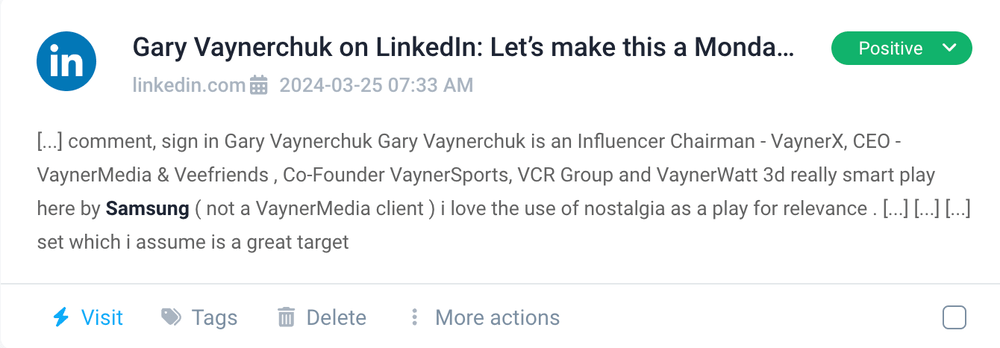
To sum up, the tool offers features like:
- Sentiment analysis
- Automated reports
- AI visibility
- Competitor analysis and comparison
- Alerts and notifications for specific keywords or trends
- Share of voice in the industry (also UGC content)
- Influencer identification
- Hashtag analytics
- AI Insights
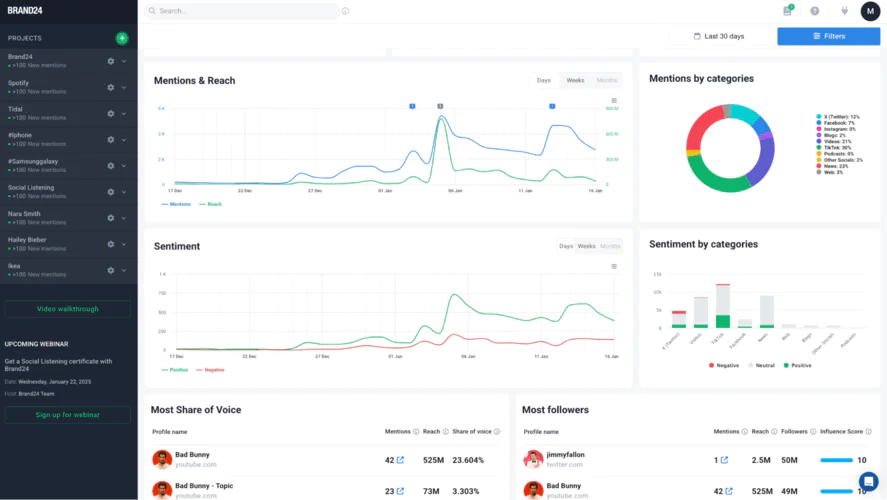
⭐️ Star rating:
4.6 stars on G2 (298 reviews) & 4.7 stars on Capterra (236 reviews).
Reddit users highlight how the tool combines various features in one place.
💪 Strengths:
- Sentiment analysis
- AI features that speed up the analysis
- Notification system for real-time updates.
👎 What could be better:
- No access to historical data – the analysis includes historical data from only 30 days before the monitoring project setup.
💡 Overall verdict:
This tool is perfect for all types of companies. It introduces many new features, like the recent AI visibility, and keeps evolving. It offers fantastic AI-based insights, including a chat that combines ChatGPT knowledge with social listening data that speed up the whole process of analysing LinkedIn. To sum up – it’s a great value for money.
02 LinkedIn Native Analytics
LinkedIn offers some quite advanced analytics and valuable data internally for free, so it’s worth checking it out.
To find data for your company page, simply go to your page’s profile and click on “Analytics” in the LinkedIn company page dashboard. After entering the panel, you can choose from a few tabs:
- Content
- Visitors
- Followers
- Leads
- Competitors
- Employee Advocacy
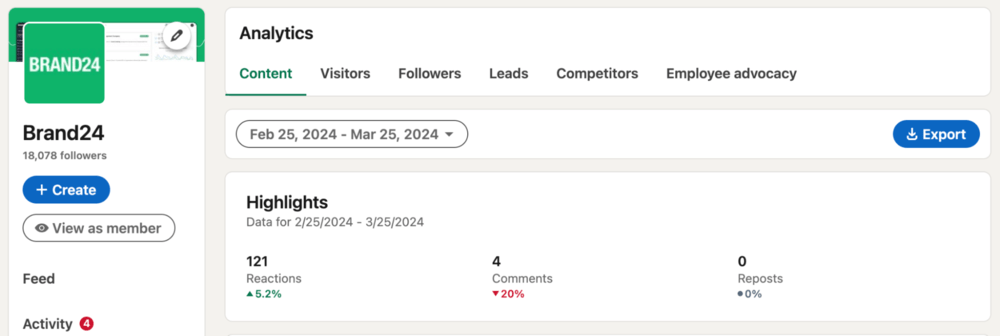
Each of these tabs gives you unique LinkedIn data about your profile’s performance and can help you understand:
- Engagement trends
- Audience demographics
- Follower demographics
- & other key LinkedIn metrics
These audience insights are invaluable for improving your social media strategy.
Unfortunately, if you run mutual LinkedIn profiles, you have to access the analytics for each LinkedIn company page separately.
Same thing when it comes to running multiple accounts – this tool includes LinkedIn only.
It’s impossible to compare your profile data in one place without advanced social media AI analytics tools.
But I personally love that you can download all the stats as a report with just one click using the “Export” button in the top right corner.
Here’s a quick overview of what LinkedIn native analytics offer:
- Content analysis
- Visitor and follower insights
- Competitor comparison
- Employee analytics
- Linkedin reports
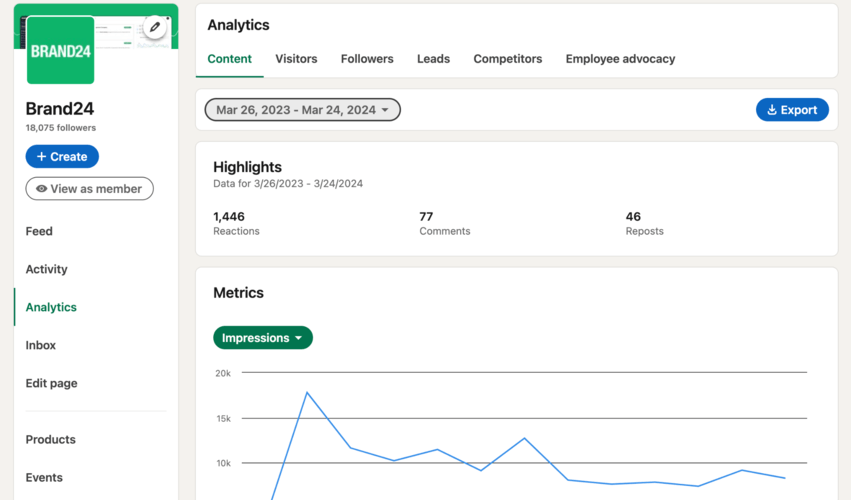
⭐️ Star rating:
As an internal analytics tool, it’s not placed on platforms like G2 or Capterra.
But Reddit users often mention it as a “good enough” as a free option.
For example, @MehulFanawala on Reddit said:
“Earlier I used Shield, but these days I’m only using LinkedIn analytics as it’s solving my purpose.”
💪 Strengths:
- Free to use.
- Offers comprehensive follower insights.
👎 What could be better:
- Limited to LinkedIn analytics data.
- Requires separate access for each LinkedIn profile.
💡Overall verdict:
It’s the best option for small businesses and individuals with limited budgets. However, it’s less suitable for advanced needs like cross-platform analysis.
03 SocialPilot
SocialPilot is an excellent choice for marketing agencies, SMBs, multi-location brands, and professionals.
It combines key metrics analytics with social media management tools.
It offers features like:
- Analytics dashboard
- Engagement metrics
- Audience insights
- Customizable LinkedIn reports
- Multi-account analytics
- Hashtag performance analysis
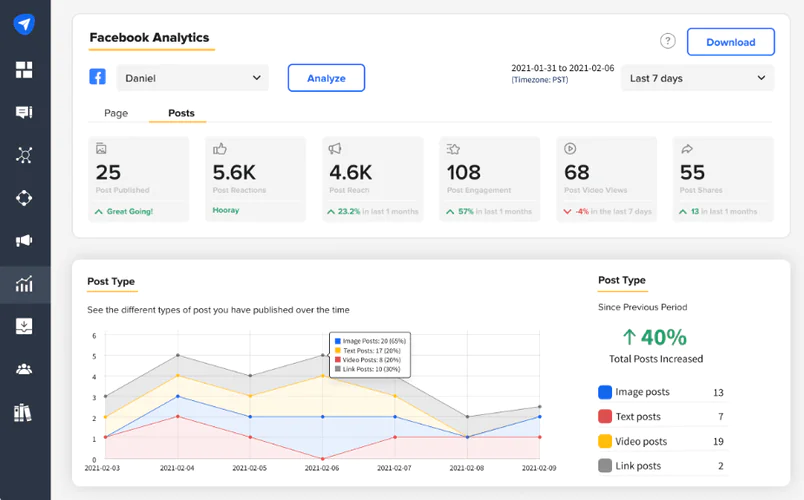
⭐️ Star rating:
4.5 on G2 (836 reviews) and 4.4 on Capterra (375 reviews).
But Reddit users didn’t mention it even once in the main thread related to LinkedIn Analytics tools.
💪 Strengths:
- Intuitive and user-friendly dashboard.
- Comprehensive analytics tailored for small businesses.
- Affordable compared to competitors.
👎 What could be better:
- Lacks competitor tracking and post-boosting features.
- Limited options for custom reports.
- Users on Capterra and SoftwareAdvice mention that analytics can be basic or less flexible than desired, especially for in‑depth strategic analysis.
💡Overall verdict:
SocialPilot is ideal for small businesses and marketing agencies. It helps businesses streamline their LinkedIn strategy and access data for multiple accounts. However, it lacks competitor tracking and advanced analytics.
04 Brandwatch
Brandwatch is a top-tier analytics tool tailored for brands, medium to larger businesses, and enterprises.
What sets Brandwatch apart is its analytical depth, particularly for LinkedIn.
It provides:
- Real-time LinkedIn analytics
- Advanced sentiment analysis
- Competitor benchmarking
- Audience segmentation
- Audience growth tracking
These features enable businesses to optimize their LinkedIn presence and develop content strategies based on real data.
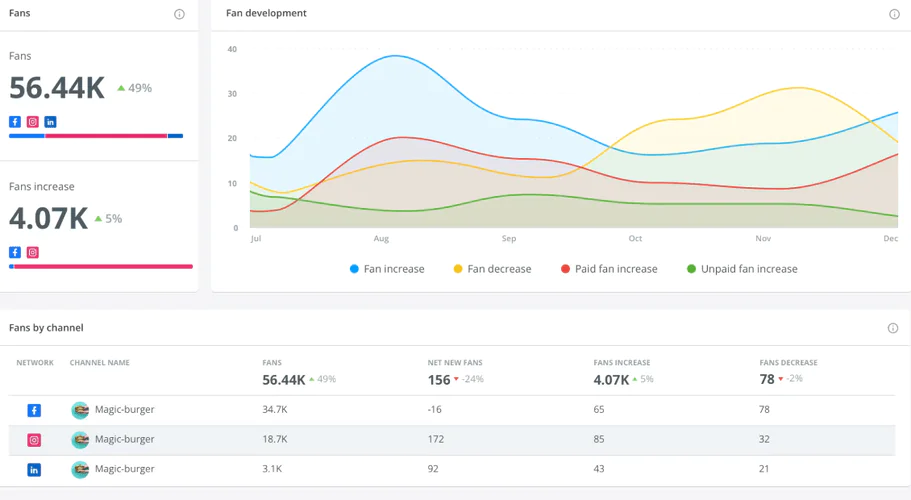
⭐️ Star rating:
4.2 on G2 (1543 reviews) and 4.2 on Capterra (237 reviews).
💪 Strengths:
- Advanced sentiment analysis to understand audience tone and interactions.
- Audience segmentation for tailored marketing strategies.
- Highly detailed and customizable reporting capabilities.
👎 What could be better:
- Limited database for LinkedIn-specific insights.
- Many users say Brandwatch is powerful but complex, so beginners may find onboarding challenging.
💡 Overall verdict:
Brandwatch is a high-level analytics and reporting tool suited for enterprises and brands looking for advanced competitor benchmarking and LinkedIn optimization. The feature set is definitely worth trying if you need deep analytics. However, Brandwatch is positioned at the higher end.
05 Keyhole
Keyhole is one of the social media analytics tools that mainly focuses on measuring LinkedIn page performance.
It gives you insights into key engagement metrics like the performance of LinkedIn posts, engagement rate, and average likes per post during a certain period.
Its fun feature is finding new potential audiences based on comparative analytics.
Plus, on its dashboard, you can see if your account is bigger or smaller than your competitors.
The tool also enables you to learn whether you’re getting more or less engagement and how much attention you’re getting compared to them.
It covers features like:
- Real-time post tracking
- Follower behavior and industry targeting
- Comparative analytics across social platforms
- Hashtags analytics
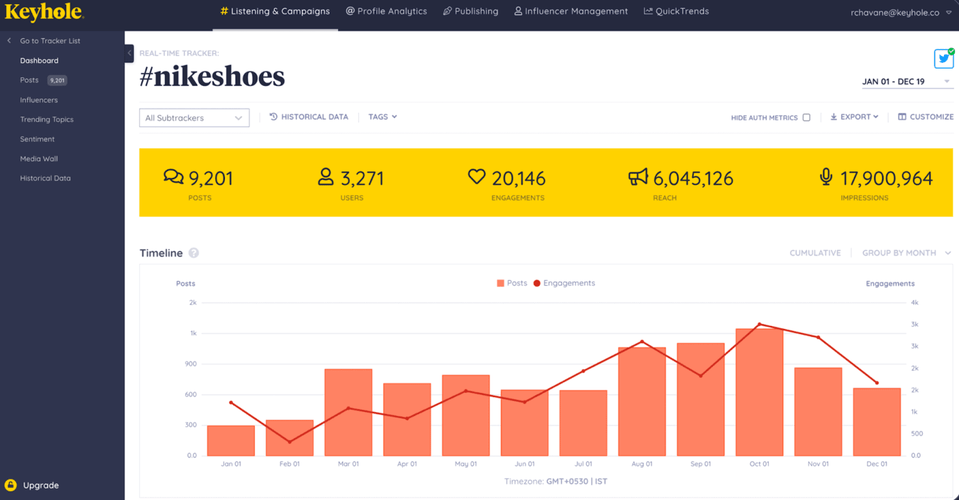
⭐️ Star rating:
4.3 on G2 (69 reviews), and 5 on Capterra (only 2 reviews)
💪 Strengths:
- Detailed competitor analysis.
- Comprehensive engagement metrics.
👎 What could be better:
- Lacks advanced AI features.
- Requires time to interpret some metrics manually.
💡 Overall verdict:
Great for marketers looking to analyze engagement trends and compare performance against competitors. But, it’s quite expensive – a “LinkedIn-only” use case may not justify the cost.
06 SentiOne
This tool might be an option for businesses that want to know how people feel about them. It finds social mentions about your brand, giving you many valuable audience insights.
Plus, you can see whether your LinkedIn profile is getting more or less engagement than others.
How does your online presence stack up against competitors? What’s your online sentiment? This tool knows the answers.
It covers features like:
- Social listening
- Competitor monitoring
- Sentiment analysis
- Real-time alerts
- Easy-to-understand dashboards
However, some experts admit – there’s a lot SentiOne can do, so it might take a little while to learn all the ins and outs.
Plus, on G2, users often mention inadequate reporting, implying that reporting features may lack customization or depth.
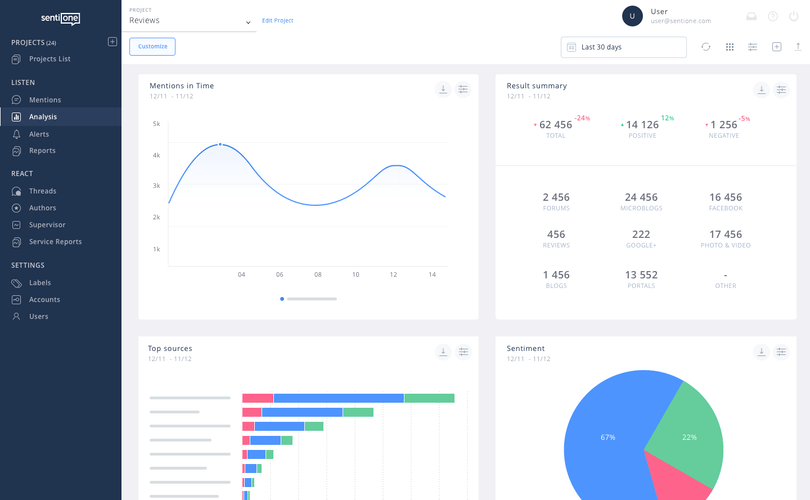
⭐️ Star rating:
4.7 on G2 (36 reviews), and 4.7 on Capterra (only 3 reviews)
💪 Strengths:
- Broad source coverage.
- Real-time sentiment tracking.
👎 What could be better:
- Complex to set up and use initially.
- Sentiment-focused – so it might not be versatile enough.
💡Overall verdict:
A powerful tool for mid-sized and large businesses focused on sentiment and competitor analysis. It has a steep learning curve.
07 GoLogin
GoLogin is a tool that can help you manage multiple LinkedIn accounts effectively.
It’s made to help you grow your LinkedIn network safely without breaking LinkedIn’s rules or risking your account getting suspended.
Compared to other LinkedIn Analytics tools, it’s an interesting option if you want to use LinkedIn for b2b marketing or networking.
At the same time, it’s more suitable for large teams and agencies.
And it doesn’t offer any advanced analytics.
It enables:
- Team collaboration on LinkedIn accounts
- Multi-account management
- Security against LinkedIn bans.
However, just like any other tool, it has its limitations. In this case, it is its over-specialization in account management over analytical depth. Most people lack insights and data from this tool.
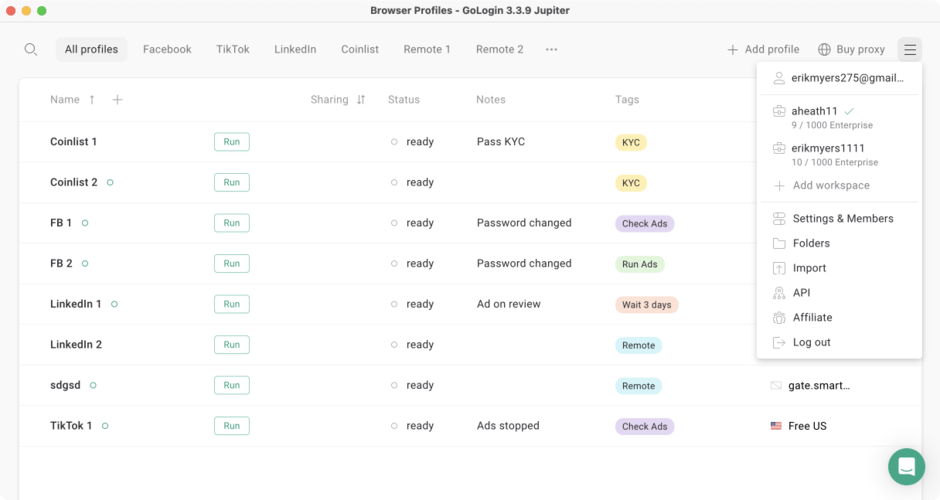
⭐️ Star rating:
4.7 on G2 (73 reviews) and 4.6 on Capterra (116 reviews).
💪 Strengths:
- Simplifies multi-account management.
- Ensures account security.
👎 What could be better:
- Overly specialized, with limited analytics.
💡Overall verdict:
Best for large teams managing multiple LinkedIn accounts. If your main goal is to analyze, monitor, or report on LinkedIn performance, GoLogin is not the tool for that.
08 Klipfolio
This is a go-to among big corporations regarding LinkedIn’s analytics tools.
Why? Mainly for its data-rich and customizable dashboards. But also because of its great cooperation capabilities.
This software is divided into three main tools:
- Klips
It is the place where you can create custom dashboards and reports for analysts to track, measure, and share LinkedIn metrics. - PowerMetrics
It’s a place designed for leaders to use and work on data. Non-technical people can easily create charts or segment data based on filters without any advanced help. - MetricHQ
It’s an internal dictionary for everything related to metrics and KPIs.
It covers features like:
- Highly customizable data reporting
- Progress monitoring
- Centralized access to dashboards
But its advanced and quite complex features might be hard to manage for less tech-savvy users.
Custom metrics or more advanced dashboards often require knowledge of APIs, SQL, or scripting.
And several G2 users mentioned needing a developer or data specialist to set up custom configurations.
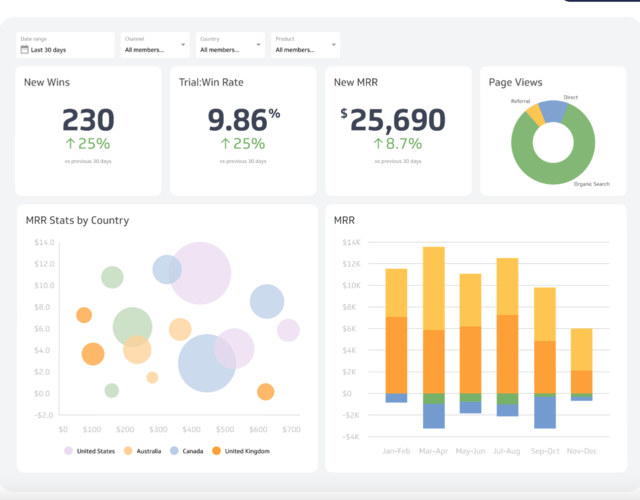
⭐️ Star rating:
4.5 on G2 (256 reviews) and not listed on Capterra.
💪 Strengths:
- Highly customizable.
- Perfect for cross-platform reporting.
👎 What could be better:
- The steep learning curve for new users.
💡 Overall verdict:
It’s most beneficial for mid‑size to large businesses, agencies, or marketing teams with technical resources (e.g., BI or data analysts) who want to unify LinkedIn performance metrics with broader business data in one place.
09 Whatagraph
Whatagraph provides valuable insights in a visually appealing, user-friendly way. It’s great for cross-channel reporting.
Plus, you can connect LinkedIn Ads accounts to report on metrics like impressions, clicks, conversions, campaign performance broken down by device, campaign ID, date, etc.
Plus, it goes beyond just LinkedIn data and integrates with platforms like Snapchat, Instagram, Facebook, and others.
The ability to track it all with a single platform makes tracking brand performance, measuring ROI, and presenting results easier.
It covers features like:
- Integration with multiple data sources for comprehensive reporting
- Automated, customizable reporting schedules
- User-friendly templates for quick setup
However, its high price might deter small businesses or individual users.s.
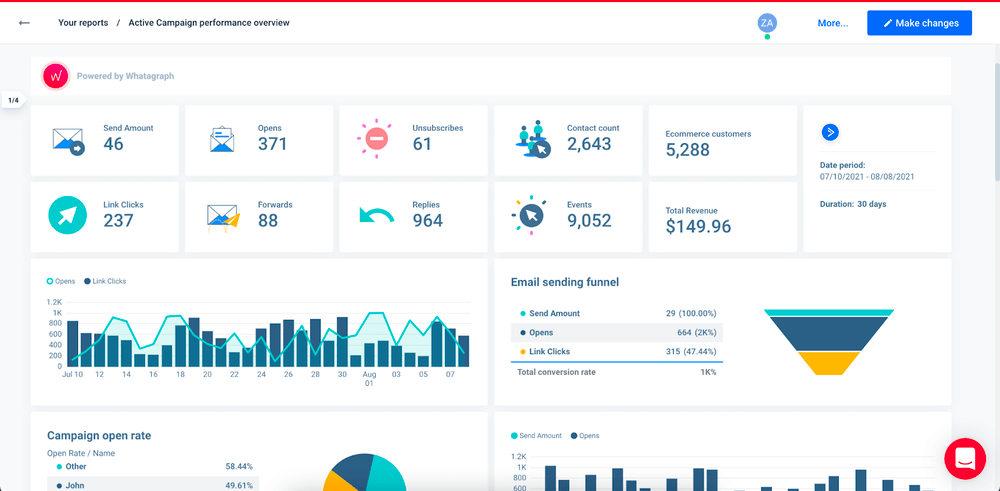
⭐️ Star rating:
4.5 on G2 (277 reviews) and 4.4 on Capterra (84 reviews).
💪 Strengths:
- Visually appealing reports.
- Cross-platform data integration.
👎 What could be better:
- Expensive for small businesses.
💡 Overall verdict:
A great choice for those managing large numbers of clients or requiring extensive customization, especially at a small‑team or solo‑practitioner scale, due to cost and pricing structure.
10 Social Champ
Social Champ offers detailed analytics with a focus on engagement and impressions, which are particularly beneficial for social media marketers.
It’s especially beneficial for understanding audience interaction patterns, although it may lack the advanced AI insights some competitors offer.
It gives you access to:
- Tracking post performance
- Engagement metrics analysis
- Posting time recommendations
Opting for a tool with an AI solution may be more efficient. These AI features can help us analyze the data and simplify the job. Thanks to that – we specialists can focus on the work that really matters.
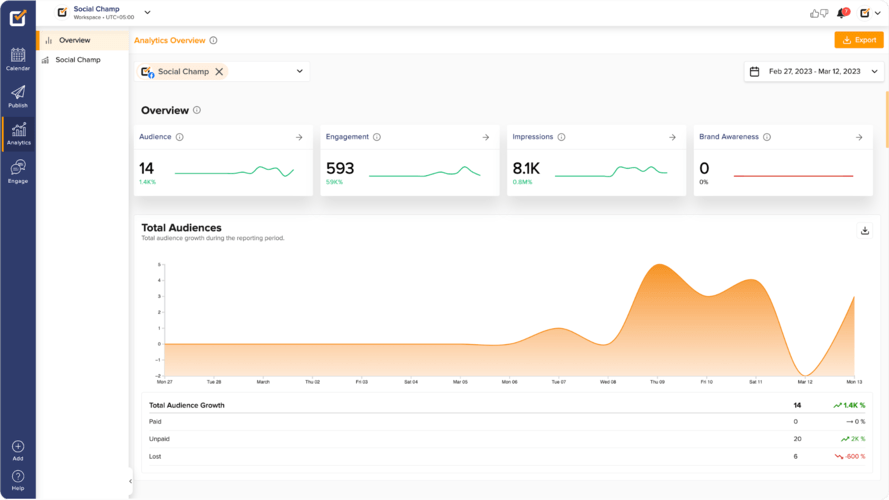
⭐️ Star rating:
4.4 on G2 (32 reviews) and 4.4 on Capterra (69 reviews).
💪 Strengths:
- Easy-to-use interface.
- Detailed post analysis.
👎 What could be better:
- Lacks advanced AI features.
💡Overall verdict:
A good choice for small to medium teams. But, if yours focus is on in‑depth LinkedIn analytics, advanced content formats, or iron‑clad scheduling reliability, Social Champ may fall short compared to more comprehensive or enterprise-grade tools.
11 Vaizle
Vaizle is also a tool designed to track your LinkedIn post performance and visitor insights.
Its focus is mainly on LinkedIn, which might limit broader social media analytics needs.
But it can also be a good thing – if you are looking for a less pricey tool and want to focus on LinkedIn performance, this is a great choice.
It covers features like:
- Detailed performance metrics for each post
- Comprehensive visitor demographics
- Insights into LinkedIn ads effectiveness
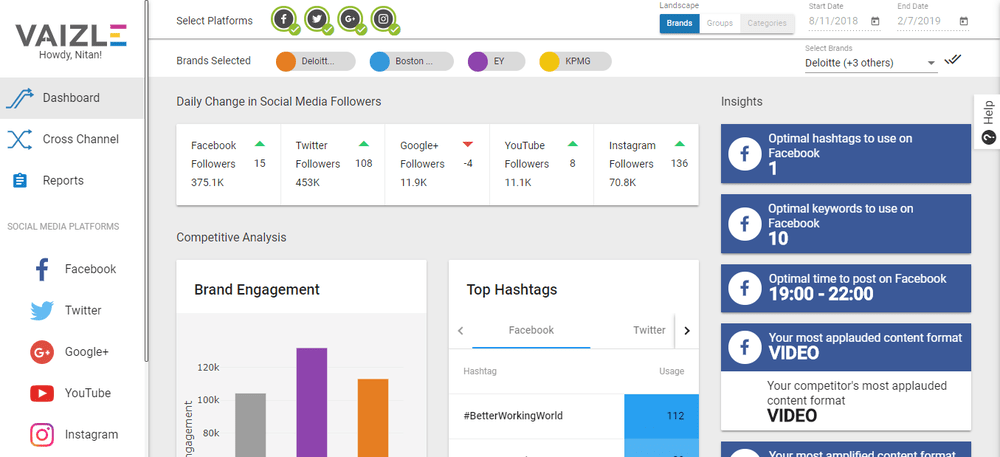
⭐️ Star rating:
4.2 on G2 (36 reviews) and 4.4 on Capterra (50 reviews).
💪 Strengths:
- Affordable.
- Ability to export data and integrate with Google Sheets or Excel.
- Simple and focused features.
👎 What could be better:
- Limited to LinkedIn-only data.
💡Overall verdict:
Vaizle is a great choice for marketers and teams who need fast, insightful LinkedIn analytics without high cost. However, it’s not as robust in cross‑platform comparison or in-depth competitor analysis.
Conclusion
So, there you have it! A list of the best LinkedIn analytics tools for 2026.
Each of the tools is different. Just because someone said that this particular one was extremely successful for them doesn’t really mean it will drive the same results for you.
So, focus on your LinkedIn goals and watch your numbers increase!
Key takeaways:
- Choose a tool that does what you need. If you want to know more about your followers or how your posts are doing – pick a tool that focuses on audience analytics.
- Keep it simple. Go for a tool that’s easy to understand. You don’t want to waste time figuring out how to use it.
- Make the most of free trials. They’re a no-stress way to see if you like the tool without spending anything.
I know it’s easier said than done… I keep my fingers crossed that you will find the absolute game-changing LinkedIn tool. And if you want to start right away – click here for a Brand24 free trial.
FAQ
What are the most important features of a great LinkedIn analytics tool?
Generally, the key features of the best LinkedIn analytics tools include:
- Tracking LinkedIn analytics
Your tool should be able to track key metrics like engagement rates, likes, shares, comments, and overall interaction with your content. Tracking LinkedIn analytics is crucial for evaluating engagement metrics. - Audience insights
It should offer essential insights into your audience demographics, including job roles, industries, company sizes, and locations. - AI features
Tools that help you track LinkedIn metrics and guide you in interpreting this data can simplify and improve your daily work as a marketer, enhancing your organization’s social media strategy. - Competitor analysis
Tools that enable you to do a competitor analysis of your LinkedIn performance or benchmark your marketing efforts are always a good idea. - Follower growth analysis
You should be able to monitor the growth or decline of your follower base over time and, even better – know the reasons behind those spikes. - Sentiment analysis
Evaluating the tone and sentiment of mentions and interactions is crucial for your brand reputation management. - Alerts and notifications
It’s not necessary, but this feature can make your work much easier. As a busy marketer, getting immediate alerts for specific keywords, trends, or unusual spikes in activity is a great help. - User-Friendly interface
Easy navigation and a clear layout are especially important for teams that lack technical expertise.
An ideal LinkedIn analytics tool combines these features, offering a comprehensive, user-friendly solution for you to effectively measure, understand, and improve your LinkedIn presence.
How to choose a LinkedIn analytics tool?
Start by defining your goals:
- Do you want to track how your posts are doing?
- Are you curious about who’s checking out your profile?
- Maybe you want to keep tabs on your competitors?
Knowing what you want to achieve on LinkedIn makes a choice much easier.
Once you have your goals pinned down, follow these steps:
- Match your goals with features
- Check if the tool can work with other software you’re using. It’s all about making life easier, not harder.
- Opt for an easy tool (for you) to navigate. I know that advanced features are tempting. But, you don’t want to spend hours figuring out how to use it.
- Keep your budget in mind. Remember, more expensive doesn’t always mean better.
- Check the reviews. It’s better to spend some time checking the review sites before the final decision.
- If there’s an option for a free trial, take it! It’s the best way to know if it’s the right fit for you. Take Brand24, for example. This tool provides a 14-day free trial to determine whether it fits well.
With these steps in mind, finding the perfect LinkedIn analytics tool can be much easier and fun.
After all, it’s all about finding the right fit for YOUR OWN LinkedIn goals!


















